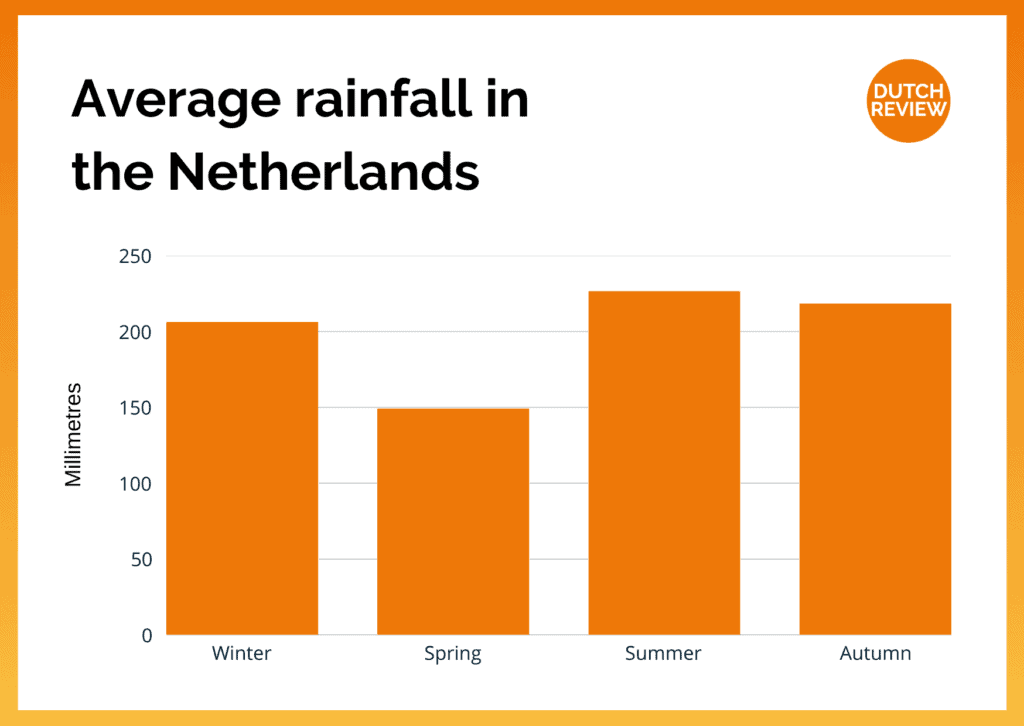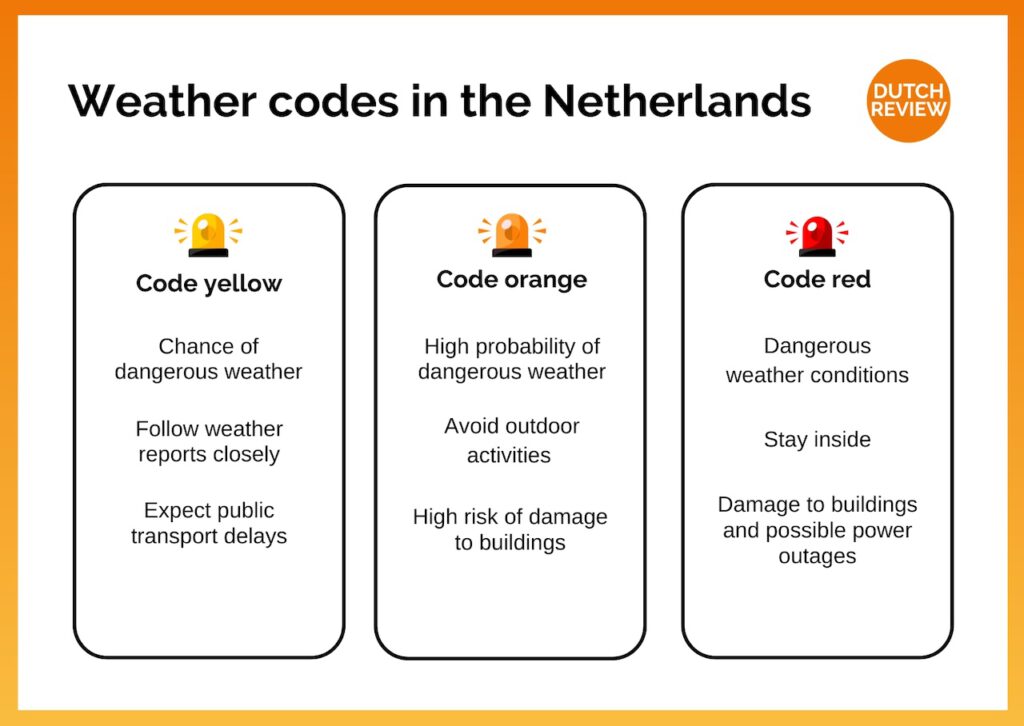Weather in the Netherlands tends to be one of the topics people here love complaining about the most. But what exactly is making us so grumpy?
Grab your windbreakers and your umbrellas, and let’s try to understand the moody Dutch weather.
What Dutch weather is generally like
For starters, the Netherlands has an oceanic or maritime climate since the country is next to the sea.
That means that even though the Netherlands does have the classic four seasons, its winters aren’t ridiculously cold, and its summers aren’t too hot either.
Besides the mild temperatures, the sea keeps the Netherlands humid and windy, meaning there’s frequent rain and strong winds.
🌡️ Average annual temperature: 10 degrees Celsius
☔️ Average number of rainy days: 130
☀️ Average number of sunny days: between 70 (in the very east) and 90 (in the very west)
Although the weather in the Netherlands doesn’t vary too much by province, there are still some seasonal and regional differences, so let’s dive right in. 👇
❄️ Winter weather in the Netherlands

Winter in the Netherlands brings oliebollen, ice skating and light shows — along with chilly temperatures, icy streets, and a lot of rain.
🌡️ Average winter temperatures in the Netherlands
The average winter temperature for the past 30 years has been just above four degrees Celsius. However, frequent and harsh winds can often make it feel even colder.
The average daytime temperature is slightly higher, almost 7 degrees, and the average nighttime temperature is 1.3 degrees.
The Netherlands also sees very little sun during the winter months — an average of 2 hours per day, which contributes to the cold and seasonal depression. 😬
☔️ How much does it rain?
Much like every other season, wintertime in the Netherlands sees a lot of rain. For the past 30 years, the average precipitation over the winter months (December, January and February) has been just above 206 millimetres total.
READ MORE | 27 ways to thrive in the gloomy Dutch weather
That means rainfall isn’t extremely heavy — but it is pretty evenly spread out throughout the season, so we don’t really catch any longer dry breaks.
The wettest winter month tends to be December.
🧢 What to wear
Be prepared for the rain, of course. An umbrella or raincoat is pretty much always a Dutch must.
A scarf, hat, and gloves will protect you from the chilly wind.
If you plan to stay outside for longer, use sufficient layers to stay warm. Thermal underwear, woollen sweaters, and thick jackets or coats are always a good idea.
🌡️ Average temperatures: 4.2 degrees Celsius
☔️ Average rainfall: 206.4 mm
☀️ Average hours of sunlight: 222
🌷 Spring weather in the Netherlands
The sun starts rising earlier and setting later in the spring. It starts to get a bit warmer, but the Dutch weather also becomes very unpredictable.
🌡️ Average spring temperatures in the Netherlands
Longer days mean slightly more sun (average of six hours per day), so the average spring temperature in the Netherlands for the past 30 years stands at 9.7 degrees Celsius.
READ MORE | Dutch Quirk #78: Watch the cows dance when they’re let out for the spring
Because spring is a transitional season in the Netherlands, the coldest and warmest points of the day can be very different, though.
The average maximum temperature over March, April and May for the past 30 years has been just below 15 degrees Celsius.
☔️ How much does it rain?
Spring is not just more sunny, it also tends to rain a bit less than in the winter. Hoera!
The average precipitation over March, April and May for the past 30 years is just below 150 millimetres per season.
The driest month tends to be April. The average precipitation is around 40 mm, compared to over 55 mm in the other two spring months.
🧢 What to wear
Spring weather in the Netherlands is extremely unpredictable.
Don’t be surprised if you’re leaving the house in the sun and coming home soaked and cold. Make sure you always have the option to put some extra layers on (or take some off).
🌡️ Average temperatures: 4.2 degrees Celsius
☔️ Average rainfall: 206.4 mm
☀️ Average hours of sunlight: 222
☀️ Summer weather in the Netherlands

Say hello to the longest and warmest days of the year… and more rain. 🙃
🌡️ Average summer temperatures in the Netherlands
Unsurprisingly, summer is the warmest season in the Netherlands with the most sunshine (an average of seven hours per day). Still, don’t expect extremely high temperatures.
The average temperature over June, July and August for the past 30 years has been around 17 degrees, with a daytime average of 23 degrees and a nighttime average of 12 degrees.
Because the Netherlands is a very humid country, though, even just warm temperatures can be difficult to bear and can cause you to sweat a lot.
Although summers are becoming increasingly hotter, the Netherlands still isn’t a country built for heat. It’s not unusual that your Dutch house wouldn’t have air conditioning.
READ MORE | The best places to swim outdoors in Amsterdam to beat the heat
Feeling sweaty? Cool down at the beach or in a Dutch lake or canal. The North Sea reaches about 20 degrees in the summer, and lakes tend to be another couple of degrees warmer.
☔️ How much does it rain?
Summer in the Netherlands doesn’t mean that the rain stops. The average summer precipitation is the highest of the year, though the difference between it and the winter isn’t stark — again, rain is spread pretty evenly throughout the whole year.
The mean over June, July and August for the past 30 years has been around 226 millimetres.
🧢 What to wear
Keep it light and breathable for the humid Dutch summer. However, as per usual in the Netherlands, be ready with an extra layer in case of a sudden summer storm.
🌡️ Average temperatures: 17.6 degrees Celsius
☔️ Average rainfall: 226.6 mm
☀️ Average hours of sunlight: 640
🍂 Autumn weather in the Netherlands
Autumn in the Netherlands tends to be pretty similar to spring in terms of temperatures. However, it does rain a bit more.
🌡️ Average autumn temperatures in the Netherlands
The mean temperature over September, October and November in the Netherlands for the past 30 years is about 11 degrees.
The average daytime temperature is more than twice as high as the average nighttime one — 14.7 degrees compared to 7 degrees.
☔️ How much does it rain?
All three autumn months see quite a lot of rain, with the 30-year average for September, October and November reaching around 218 millimetres.
🧢 What to wear
Your autumn Dutch wardrobe can look pretty similar to your spring one.
Be ready with a lot of layers to accommodate temperature changes throughout the day, and (surprise, surprise) be ready for the rain.
🌡️ Average temperatures: 14.7 degrees Celsius
☔️ Average rainfall: 218.5 mm
☀️ Average hours of sunlight: 348

Regional differences
Although the difference in weather between Dutch provinces is relatively small, there are some distinctions between regions in the Netherlands.
The coastal regions tend to get more hours of sunshine and less fluctuation in temperature.
READ MORE | Why is the Netherlands so flat? The complete explanation
That means inland Netherlands get warmer summers and colder winters, as well as less rain compared to the coast.

🌬️ Major weather events in the Netherlands
💨 Wind in the Netherlands
The Netherlands is notoriously windy all year round. Nevertheless, the period from October to March is windier than the other half of the year.
The windiest month is usually January, and the least windy is July. Coastal regions experience stronger winds than inland Netherlands.
⛈️ Storms in the Netherlands
A storm in the Netherlands is defined as when the average hourly wind speed is at least 75 kilometres per hour.
That corresponds to a wind force of nine, but the Netherlands also experiences storms with a wind force of 10 and 11. A wind force of 12 is considered a hurricane and very rarely occurs in the lowlands.
READ MORE | How do the Dutch feel about climate change?
The most severe storm in recent times was Eunice in February 2022, when the highest wind force measured was 145 km/h.
🥵 Heatwaves in the Netherlands
A heatwave in the Netherlands means at least five days of temperatures of at least 25 degrees, with at least three of those days reaching at least 30 degrees.
As a result of climate change, heat waves are becoming increasingly common in the Netherlands.
In the period between 2019 and 2024, the Netherlands experienced seven heatwaves. One of the heatwaves in 2019 also recorded the highest temperature ever: 40.7 degrees.
Compare that to the period between 1989 and 1994, when only two heatwaves occurred.
☃️ Snow in the Netherlands
If the first image that comes to mind when you think of Dutch winter involves frozen canals, that perception might be outdated.
While the Netherlands still experiences snowfall, it’s rarely freezing cold, especially for several days in a row, so any potential snow doesn’t really stick around.
The average number of snowy days across all three winter months is 15, but a few snowflakes already make a day count as snowy. The number of days when it remains white is therefore even lower.
READ MORE | Every year, winter will be one day shorter in the Netherlands due to climate change
The highest chance of snow is in the coldest Dutch month, January.
🚨 Dutch weather codes from the KNMI
In case of extreme weather, the KNMI (Dutch Royal Weather Institute) might issue a warning.

This can be a code yellow, orange or red and ranges from least to most severe in that order.
When a code yellow is issued, you should pay special attention to weather reports when going outside.
If it’s a code orange, you should avoid outdoor activities, especially in the forest.
A code red means you should only go out if it’s absolutely necessary.
📰 Best resources for the Dutch weather
KNMI
The KNMI (Royal Dutch Weather Institute) is the government authority for all things weather-related in the Netherlands.
The KNMI is also the official issuer of weather warnings for the whole country.
Buienradar
If you’re wondering when to leave the house with the least chance of getting absolutely soaked, Buienradar is your best friend.
It shows you the hourly amount of rain where you are, so you can avoid going outside during “peaks”.
Weeronline
For weather forecasts and weather-related news, Weeronline is a reliable and popular resource in the Netherlands.
DutchReview
Finally, DutchReview (that’s us!) also reports on significant weather events and any weather codes issued.
Follow us on Instagram to stay up to date with the latest news and weather events.
Dutch weather can be tricky, but it’s not impossible to navigate. Follow our tips, grab your raincoat and make the most out of the weather in the Netherlands.
Do you have any tips for surviving the weather in the Netherlands? Let us know in the comments below!


